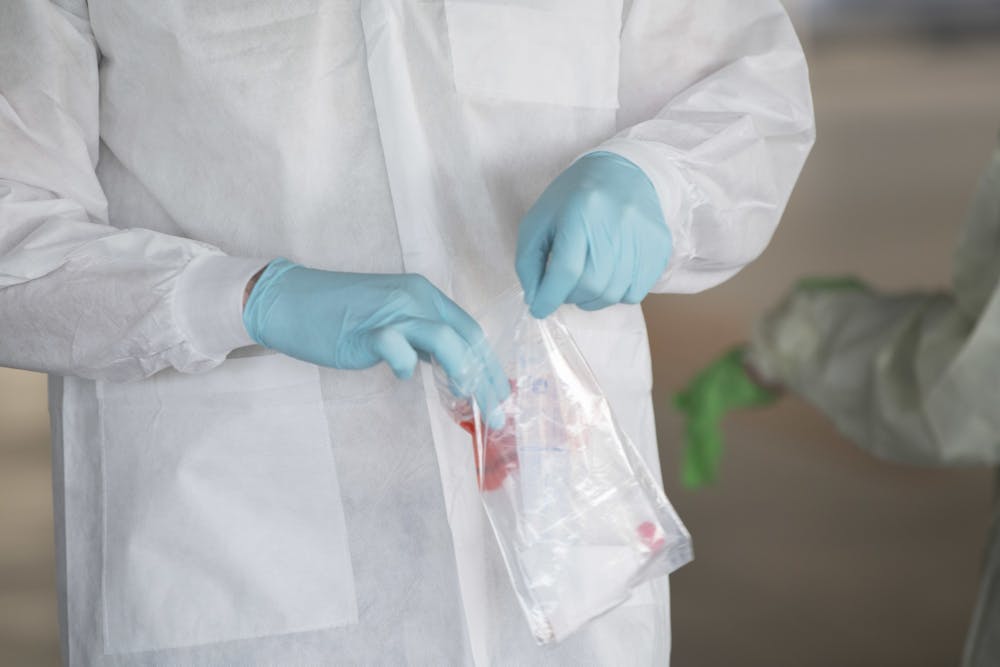Last month, University President Christopher Eisgruber ’83 announced that the University would establish an on-campus testing laboratory to facilitate COVID-19 testing.
After months of coordinated preparation among University staff, the lab — located within the Molecular Biology Department — is now operational.
Previously, the University sent samples to an external laboratory partner, which took some 48 to 72 hours to return results. The on-campus lab will allow for “faster turnaround,” according to University Spokesperson Ben Chang.
Faculty involved with the lab did not provide an exact number of tests the system could support, stating that the lab would adapt to the University’s testing needs.
“The lab will respond to what it’s asked to do,” said Senior Research Scholar and Professor in Molecular Biology Daniel Notterman, who is a part of the team responsible for setting up the campus testing laboratory.
Chang explained that Eisgruber decided in the spring that the University would need to build its own testing laboratory in order to reopen.
“At the time, resources and testing capabilities were extraordinarily scarce, and he was determined that the University, as it worked to reopen the campus, would not be a drain on the testing capacity throughout New Jersey and should have an in-house capability for faster turnaround of results,” Chang wrote in a statement to The Daily Princetonian.
Chang said that comprehensive testing is a necessary condition for bringing more students back to campus in the spring, but added that it is only one of many factors the University is considering.

Eisgruber is expected to release a reopening decision about the spring semester in the first week of December.
“We as a University campus community will be prepared for whatever the decision is, and this testing capability is a part of that preparedness in order to support the community in whatever form it takes,” Chang said.
“Whatever our campus looks like in the spring, it’ll be very different from what any other semester has been like,” he added. “We are in touch regularly, weekly if not daily, with the Governor’s office and other government officials to see how those orders translate into a higher ed context. So all of that is factoring into what a decision would be for the spring, but having the testing capability will be an element of us striving to protect the health and well-being of the community.”
Looking towards the spring, Nassau Hall is weighing New Jersey’s increasing COVID-19 cases, governmental restrictions on gatherings, and the University’s ability to quarantine students, among other factors.

Vice Provost for Space Programming and Planning Paul LaMarche, who was integral to establishing the lab, explained the steps taken to set it up.
“We mounted a crew, we got an architect who specializes in this kind of laboratory space,” he said.
The process also involved construction, designing an IT system, and receiving the proper permits. The University received licensing from the State of New Jersey and Clinical Laboratory Improvement Amendments (CLIA) certification.
While the lab was being constructed, the team focused on hiring and training a skilled staff and obtaining the necessary equipment for COVID-19 testing.
“We’re one of the few schools in the country without a medical or veterinary center attached to it that has undertaken a project of this complexity,” Chang said.
Director of University Health Services Janet Finnie explained that testing is divided into three phases: pre-analytic, analytic, and post-analytic. In the pre-analytic phase, the specimen is matched to the person being tested. In the analytic phase, samples are processed. In the post-analytic phase, results are conveyed to those who were tested.
Approximately 10 lab technicians will work in the lab on the analytic phase — five on each of the two shifts — along with a supervisor. It will be staffed by a mix of paid University staff and contractors, along with some recent University graduates.
In ordering the equipment for the new testing lab, the team took into account the local availability of supplies.
“We would not want to drain the resources, the testing capacity around New Jersey,” Chang said.
LaMarche commended the University’s commitment to not deplete New Jersey’s testing supplies.
“Its a really great privilege to be able to work for an institution such as Princeton that really, really thinks about what the best thing to do is,” he said.
Notterman explained that the University has chosen the quantitative PCR method of testing, which tests for the expression of viral nucleic acid, RNA. Notterman explained that PCR is the most appropriate method for the University, given its accuracy and ability to process thousands of tests.
The team opted for saliva tests, because nasopharyngeal tests are uncomfortable for those being tested and risky for healthcare workers administering the test.
In addition to discomfort, the nasal test “took a fairly well trained person because the patients often sneezed or coughed” during the test and hence put “the person doing the test at some risk,” Notterman said.
The University also provides symptomatic testing in McCosh Health Center. Dr. Irini Daskalaki of University Health Services discussed the different testing methods for symptomatic and asymptomatic tests.
“Now we’re implementing a new rapid PCR ... a test that will give us a result in 45 minutes,” Daskalaki said. “It’s not conducive to thousands of tests, but for symptomatic testing where we need this determination fast to know whether we need to isolate somebody or not, we are employing this fast PCR.”








